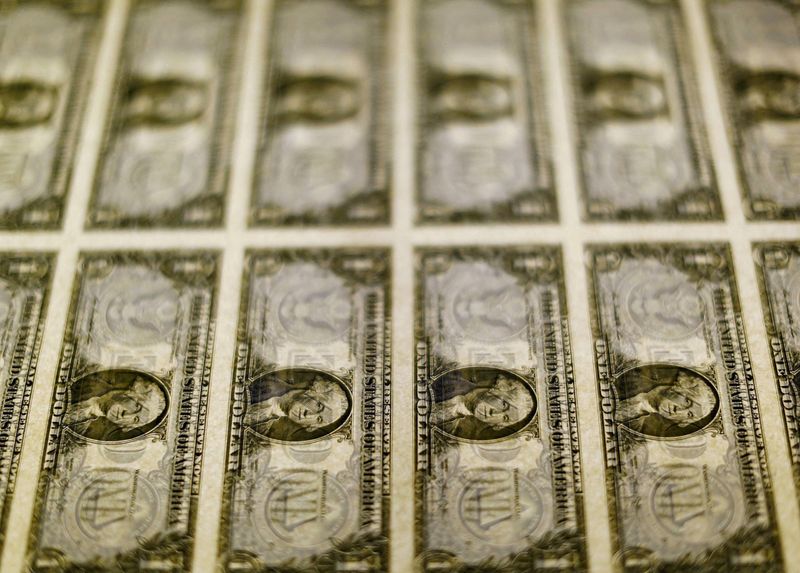 © Reuters. FILE PHOTO: United States one dollar bills are seen on a light table at the Bureau of Engraving and Printing in Washington in this November 14, 2014, file photo. REUTERS/Gary Cameron/File Photo
2/2
© Reuters. FILE PHOTO: United States one dollar bills are seen on a light table at the Bureau of Engraving and Printing in Washington in this November 14, 2014, file photo. REUTERS/Gary Cameron/File Photo
2/2
By Saqib Iqbal Ahmed
NEW YORK (Reuters) - The dollar slipped against a basket of currencies on Wednesday, after the Federal Reserve raised interest rates by 75 basis points in a historic move to fight inflation and projected a slowing economy and rising unemployment in the months to come.
The rate hike was the biggest made by the U.S. central bank since 1994, and was delivered after recent data showed little progress in its inflation battle.
U.S. central bank officials also flagged a faster path of increases in borrowing costs to come, more closely aligning monetary policy with a rapid shift this week in financial market views of what it will take to bring price pressures under control..
"The dollar largely succumbed to the buy the rumor/sell the fact dynamic in the wake of the Fed decision," said Joe Manimbo, senior market analyst at Western Union (NYSE:WU) Business Solutions, in Washington.
Against a basket of currencies, the dollar was 0.50% lower at 104.76, after rising as high as 105.79, its strongest since December 2002, in the immediate aftermath of the Fed decision.
Karl Schamotta, chief market strategist at business payments company Corpay, pointed to Fed Chair Jerome Powell's remarks during the news conference following the rate decision, where he said he does not expect hikes of 75 basis points to be common, as part of the reason the dollar sold off.
"Ultimately, Powell failed to out-hawk market expectations," Schamotta said.
"Traders are piling into currencies issued by central banks that are likely to follow today’s Fed’s hike with aggressive moves of their own," he said.
The greenback had weakened against the euro earlier in the session on news of a surprise meeting by the European Central Bank, which some traders hoped would address fragmentation risk in the region.
The so-called fragmentation risk refers to the worry that the ECB's monetary policy actions may affect the 19 nations that make up the euro zone in differing ways, with some countries logging a significant increase in bond yields disconnected from economic fundamentals.
The ECB will skew reinvestment of maturing debt to help more indebted members and will devise a new instrument to stop fragmentation, it said on Wednesday.
"The ECB meeting provided very little additional information relative to last week's policy statement," said Simon Harvey, head of FX analysis at Monex Europe.
With the renewed selling pressure on the dollar, the euro was up 0.36% to $1.0452.
Higher U.S. rates versus rock bottom Japanese yields have been weighing on the yen, which hit a new 24-year low of 135.60 per dollar early in the session before erasing losses to trade up about 1.3% against the greenback.
Sterling recovered from its lowest level against the dollar since March 2020 on Wednesday, rising 1.71% to $1.2202 but the reprieve could prove temporary with slowing UK economic growth and a potential trade conflict with the European Union weighing on the currency.
In cryptocurrencies, bitcoin slipped to a new 18-month low of $20,076.05, before paring losses to trade down about flat at $22,149.15, dragging smaller tokens down with it and deepening a market meltdown sparked by crypto lender Celsius this week freezing customer withdrawals.

